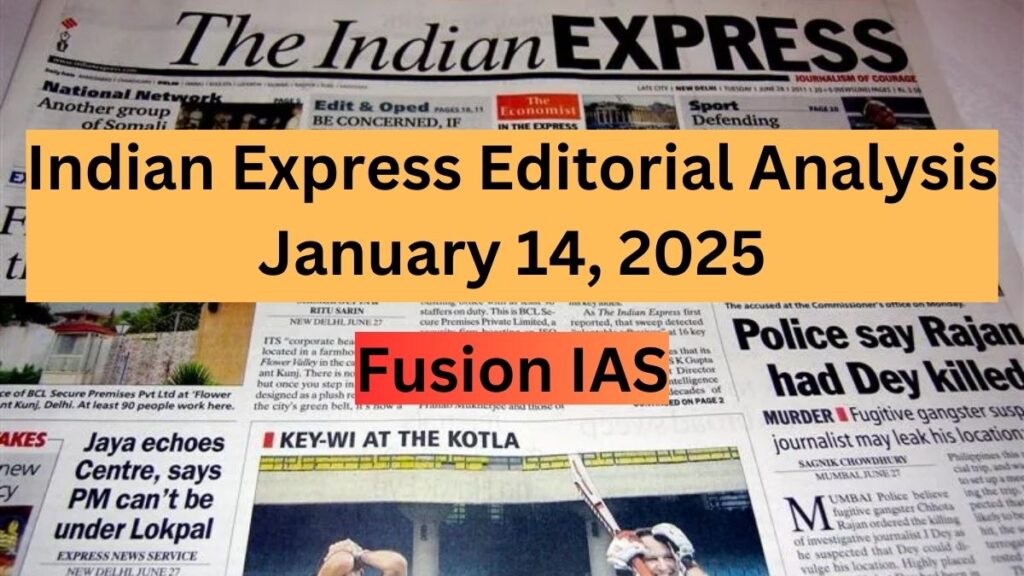The Indian Express editorial analysis offers valuable insights into current issues affecting India, providing a critical understanding of socio-political and economic matters. For UPSC CSE preparation, such editorials are essential for developing analytical skills, enhancing understanding of governance, and applying knowledge to relevant General Studies topics. Through editorial analysis, aspirants can engage with contemporary issues, assess policy impacts, and build a nuanced perspective required for the examination.
1. No, legal guarantee for MSP is not a “folly”
Context:
- The debate revolves around the demand for a legal guarantee for Minimum Support Price (MSP), with Yogendra Yadav countering arguments that deem this demand a “folly.”
Arguments Supporting Legal MSP:
- National Hypocrisy on MSP:
- MSP is widely appreciated as a concept but resisted when it comes to implementation.
- Farmers demand the realization of the MSP, which is often only symbolic.
- State’s Responsibility:
- MSP is part of an unwritten social contract between the Indian state and farmers, ensuring fair compensation.
- Climate change and global competition exacerbate challenges for farmers, necessitating state support.
- Economic Viability:
- Government waivers for corporate taxes (₹1.09 lakh crore) and public sector bank write-offs (₹2.08 lakh crore in 2022-23) reveal the fiscal capacity to support MSP.
- Ensuring MSP is estimated to cost between ₹26,565 crore (current MSP) and ₹1,68,227 crore (revised MSP with C2+50%), accounting for 0.1% to 0.62% of GDP.
- Proposed Mechanisms:
- Expand Public Distribution System (PDS): Widen the food basket and increase MSP-based procurement.
- Market Intervention Scheme: Fund targeted programs to prevent price falls below MSP.
- Import-Export Policy Reforms: Align policies to avoid suppressing domestic prices.
- Price Deficiency Payments (PDP): Compensate farmers for the gap between market prices and MSP.
- Comparison with Other Sectors:
- Growth in fisheries, poultry, and horticulture is cited against MSP but is unrelated to market-based systems.
- Crops under MSP like mustard and green gram outpaced horticulture in cumulative growth between 2011-12 and 2022-23.
- Improved PDP Models:
- Learning from failures like Madhya Pradesh’s Bhavantar scheme, more robust models like Haryana’s Price Deficiency Payment scheme (bajra) can be adopted, compensating farmers based on area sown, productivity, and price deficit.
Counterarguments to Criticism:
- Ashok Gulati’s Position:
- Gulati opposes legal MSP, citing market distortions and the promotion of collusion.
- Yadav argues that MSP doesn’t inherently impede price discovery and is critical for balancing government interventions that suppress farmer income.
- Free-Market Ideology:
- Farmers need assured MSP as free-market systems fail to address the inherent consumer bias and price suppression in India’s agricultural policies.
Conclusion:
- A legally guaranteed MSP is essential for addressing systemic issues in agriculture, ensuring fair farmer compensation, and maintaining the social contract between the state and farmers.
2. India’s growth slowdown is a signal of declining confidence in government
- Growth Slowdown:
- India’s growth forecast for FY25 revised down to 6.4% from 8.2%, the lowest since the pandemic.
- Official narratives attribute this to cyclical factors, but inadequate analytical frameworks hinder accurate predictions.
- Economic Challenges:
- Short-lived high growth episodes raise concerns about economic resilience.
- Dependence on public spending and monsoon-driven growth persists despite three decades of liberalization.
- Key indicators of stagnation:
- Declining household savings and stagnant wages.
- Sluggish private consumption and manufacturing.
- Small retail loan defaults on the rise.
- High net worth individuals emigrating and limited private sector investment.
- Issues with Capital Expenditure (Capex):
- Capex focused on Roads and Railways but lacks efficiency and productivity compared to past initiatives like PMGSY.
- Spectacular infrastructure projects overshadow smaller, high-impact investments.
- Construction labor fails to enhance human capital.
- Governance Concerns:
- “Governance delusion” due to poorly implemented schemes:
- Swachh Bharat: Limited health benefits post initial toilet construction due to groundwater pollution.
- Namami Gange: Slow progress on sewage treatment and pollution control.
- Misallocation of resources and ineffective execution erode confidence in the government.
- “Governance delusion” due to poorly implemented schemes:
- Regulatory and Political Economy Issues:
- Failure to uphold “minimum government, maximum governance”:
- Regulatory complexity in taxation and GST persists.
- Shift in corruption narratives: resurgence of retail corruption.
- Preference for political economy benefiting top 10% while neglecting systemic reforms.
- Concentration of capital among a few large players stifles competition and innovation.
- Failure to uphold “minimum government, maximum governance”:
- Investor Confidence:
- Fear of expropriation of enterprises to favor big players undermines private sector growth.
- Private skepticism about the government’s approach to growth and reform.
- Opportunities and Risks:
- Growth slowdown signals declining confidence in governance rather than cyclical issues.
- Need for real reforms and trust-building measures to harness India’s economic potential.
3. What happens when people read to be ‘hurt’
Disclaimer:
This analysis is based on the editorial content published in Indian Express and is intended solely for informational and educational purposes. The views, opinions, and interpretations expressed herein are those of the author of original article. Readers are encouraged to refer to the original article for complete context and to exercise their own judgment while interpreting the analysis. The analysis does not constitute professional advice or endorsement of any political, economic, or social perspective.
Follow Fusion IAS

